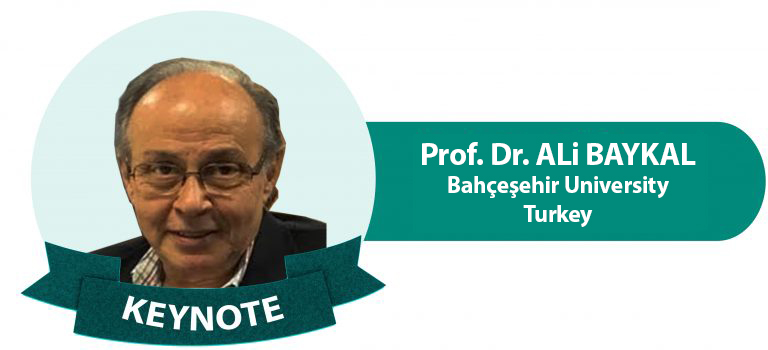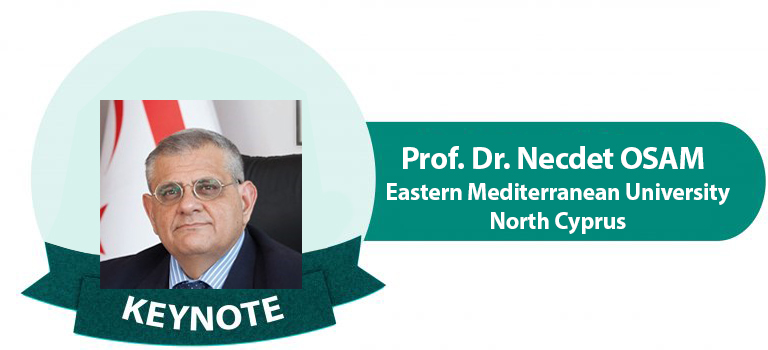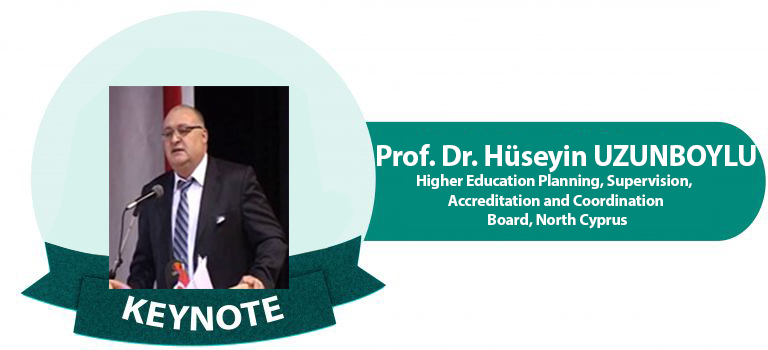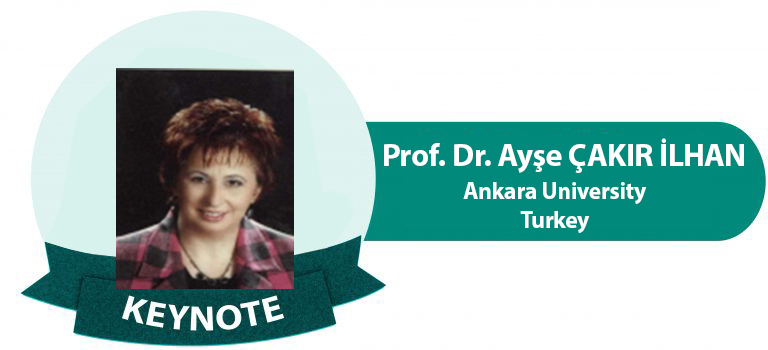
Keynote Title: HOMO SAPIENS vs. MACHINE SAPIENS: WHO WILL EDUCATE WHOM?
Eternal questions about the education in future are as follows:
- What will be the compelling inputs to instructional systems in foreseeable future?
Information bang is affecting all components of educational systems. Artificial Intelligence and Robotics will be the major items in the agenda of educators for the next coming years.
- What will be the trendy learning outcomes of future education?
Human beings will hopefully take control of the behavior of the robots propelled by AI just like they control the behavior of nature and matter.
- How will the social interactions be reconfigured in instructional systems?
Learning is an individual process but there are always others involved. This implies that cooperative modes of interactions will override competitive styles.
- What are the favorite physical settings of 21st Century education?
Anywhere in the universe can accommodate some kind of educational event. Strengths of distant learning and advantages of school activities will be blended for effective instruction. Authentic work places and schools will be brought together to make instruction relevant to reality.
- Can expository and discovery strategies replace one-way traffic in teaching methods?
Offering lip service via chalk and talk is outmoded. Active appropriate student practice is the essential condition to materialize discovery approach.
- How will the educational media evolve in the near future?
AI and Robotics are transforming all of the components of instructional systems, and they change the media and the message in the first place. Techno-mania and techno-phobia are dividing the society. Digital divide is multiplying the adverse effects of inequality in society.
- What will be the role of “teacher” in the internet era?
Technology took over the mission of knowledge transmission from the teachers but it doesn’t mean that technology can replace teacher. Teacher’s social intelligence will maintain its uniqueness in instructional systems.
Bio: Ali Baykal received his BS degree in Physics from Middle East Technical University in Ankara, Turkey in 1970. He obtained his MS and Ph. D. degrees in the field of Curriculum Development and Evaluation from Hacettepe University Ankara in 1973 and 1980 respectively. In 1974 he joined Boğaziçi University, Istanbul. He taught courses and conducted research in different fields of education. He served as the chairman of The Department of Science Education between 1982 and 1997. In 1998 he led the establishment of the Department Computer Education and Educational Technology. Within the years 1998-2002 he became the General Director of the Schools of Terakki Foundation in Istanbul. At the end of 2002 he rejoined Faculty of Education, Boğaziçi University where he served as the Dean of the Faculty between 2005-2010. During the same period he had been a member of the executive council of Turkish UNESCO commission. Since 2013 he is serving as an instructor at Bahçeşehir University. Ali Baykal published in national journals, and submitted papers to international conferences. He developed “general aptitude tests” to be used in personnel selection programs of some financial institutions in Istanbul. He had been the editor-in-chief of the Boğaziçi University Journal of Education several times. His major research areas are systems thinking in curriculum design, measurement and evaluation, computer applications in teaching and assessment, with a particular emphasis on creativity. He periodically explores data relevant to human development indicators, world university rankings and high-stake entrance exams to draw correlational and comparative inferences.

Keynote Title: “A New Age or Towards the 5th Generation of Universities: Are We Ready for Change?”
Abstract: When we study the history of the universities, we clearly see that continual change had taken place since Plato’s Academia; Aristotle’s’ Lyceum and Avicenna’s House of Wisdom (Beyt-ül Hikmet) and the role of church. Here, the primary basis or the context participants’ main aim was enlightenment. The teachers’ goal was to spread the knowledge they had and the students aim was to learn something valuable, as pointed out: enlightenment. It was the expansion of intellectuality, at the beginning. The means of teaching was Latin in the west and Arabic and Persian in the East.
The understanding of “truth” and protection of “nature” were the main concerns of the teachers and the learners. In fact, this was the first generation of universities which were run by chancellors who were religious figures.
After the middle age organization and understanding of the universities, the Humboldtian universities were generated. Here, education and pure knowledge at depth was the cardinal understanding. Research gained importance and instead of reflecting trust to “authorities”, they preferred the observable truth within the scope of science. They also shifted from Latin to national language, German. At this period Academy of Science was established in London (1918). Another important issue of the period was “education “was for everyone and the financial support was provided by the local governments. The institutions were run by part-time scientists.
With the emergence of globalism in early sixties, the most important change in the 3rd generation of universities was the medium of instruction. Now English was the key to science and utilization of knowledge. Research was regarded as a creation of the added value. This was the new role of the university. The output was professionals and entrepreneurs.
The impact of globalisation on universities gave birth to the 4th generation of universities where the main goal of the university is regarded as a driving force of economy. The use of the technology and the limits of the artificial intelligence was so fast that the protection of the truth has been in the process of modification. The limits of entrepreneurship and the competition in economy has been the key elements in the tertiary education. At this point the medium of instruction besides English became multilingual. Student mobility has reached to its peak. The universities began to be governed by professional administrators.
The developments in the fourth stage was very much different than the earlier university philosophy and the understanding of the values. This was a sort of indication of the forthcoming changes in the university education.
With the sudden spread of the Covid 19 pandemic in the world, the changes in higher education expected to occur smoothly has broken into very sharply. The long story of digital or technology based/oriented education was regarded as a unique means of saving the day. Very quickly, the universities with know- how continued to meet the students through online mainly by means of TEAMS and or ZOOM. Even the authorities above universities that declared that distance education (YÖDAK Announcement 13.3.2020 Kıbrıs ) should not be done prior to YOK and Yödak rules and regulations failed with their decisions.
This immediate change meant to be a very heavy duty on the shoulders of the instructors. They had to deliver their classes through the glass by using either of the programs provided by the university. They had to find out their own way. They did not give up and they did not let the students down. But were they really ready for this new system? Were they willing for online education? What did the professors think from their own experiences? What sort of difficulties or failures have they experienced? Most higher education institutions have a department, agency or unit that
offers technological support for teaching and learning purposes for academic staff. What about our tertiary institutions? Do we have such bodies well-formed and able to respond the needs of the users?
How about the students: Have they had equal possibility for the digital education?
Above all, the external factors, the policy makers; are they able to cope with the changes and develop non-restrictive -but values reserved means for the betterment of the present system?
Finally, I believe that education touches the lives of human beings based on human -face to face- interaction. Therefore, human side and psychology related case of education will also be touched in this keynote.
Bio: Prof. Dr. Necdet Osam was born in Cyprus in 1961. At secondary education he earned an AFS scholarship and his first encounter with diverse cultures took place in the State of Oregon, United States of America. After graduating from Hillsboro Senior High School and Nicosia Turkish High School he earned an Italian State Scholarship for tertiary education at Perugia where he studied Italian Culture and Language (1983). Later in 1988 he graduated from Selçuk University in English Language Teaching. In 1993 Prof Osam earned an MA degree at the Department of Linguistics at Hacettepe University, Ankara. At Fitzwilliam College, Cambridge University (1996) he completed a course in Applied Linguistics as a bursary student. In 1997 he earned his PhD degree at the Department of Linguistics, Hacettepe University, Ankara.
Prof Osam’s research interest has been in Sociolinguistics with specific reference to language attitudes of diverse cultures. How human beings reflect their cultural identity in their interaction and communication with others has been one of the areas he has dealt with extensively in the course of time. Besides this, the identity matters in language use and the gender related speech and behaviour have also been in his research spectrum.
In 2006, under the auspices of Prof Fishman, Prof Osam has been the issue editor of The Sociolinguistics of Cyprus II. International Journal of the Sociology of Language published by Mouton De Gruyter, Germany.
Prof Osam pays an utmost attention to the language of education with respect to language policies and also from language learning experiences. Regarding these issues, in 2015 Prof Osam and his PhD student Erkan Arkın wrote a chapter in a book entitled English Medium Education in European Higher Education edited by Dimova, Hultgren and Jensen; published by De Gruyter and Mouton, Germany.
Throughout his carrier, Prof Osam has been profoundly interested in lexis and terminology building in the native language for the advancement of scientific language of the scholarships such as Applied Linguistics, Testing and Sociolinguistics. In 2000, Prof Osam compiled a reference book, with his PhD supervisor Prof.Dr. Ahmet Kocaman, called A Dictionary of Applied Linguistics and Language Teaching, published by Hitit Press, Ankara. In 2002, another book called The Terminology Building in Testing was prepared by Osam and published by Boğaziçi University press. In 2006, Osam prepared a new book: A Glossary of Turkish Cypriot Dialect, published by Okder Press. In January 2020, his latest book The Dictionary of Testing was published by EMU Press. At the moment Prof Osam is working on a new dictionary in sociolinguistics with his former PhD students Dr. Erkan Arkın and Dr. Aman Rassouli.
Prof Osam has published in several national and international journals. He has supervised both MA and PhD in ELT students from all over Middle East, Mediterranean and Africa. Prof Osam has also had many administrative duties at the university as Vice Chair and Chair of the ELT Department; Dean of the Education Faculty, and Rector (2014 – February 2020). Prof Osam was full-time faculty member of Middle East Technical University and Çankaya University in Ankara before he moved to Cyprus. He is currently teaching at the English Language Teaching Department of Eastern Mediterranean University, where he has been a full-time academic since 1998.

Keynote Title: Will be announce….
Abstracts: Will be announce…
Bio: Huseyin Uzunboylu graduated from Anadolu University, completing a degree in BSc Educational Communicating and Planning in 1991. He graduated from Ankara University; completed a degree in MA Curriculum and Instruction in 1995 and completed PhD in area of Educational Technology in 2002. He became Assistant Professor in 2013, Associate Professor in 2015 and Professor of Educational Technology in 2010 at Cyprus Near East University.He was elected to member of “Higher Education Planning, Supervision, Accreditation and Coordination Board” by the Republican of Parliament in November in 2019.

Keynote Title: “ART AND ART EDUCATION IN THE SHADOW OF THE PANDEMIC”
Abstract: Art rests on three pillars: artist, work of art and receiver (art consumer). However, art is also dependant on the environment. This environment includes both natural and the social environment. Everything that happens in the environment affects both the artist, the work and the receiver. Due to Covid-19 being declared by the World Health Organization as a pandemic, societies continue to go through extraordinary days since the beginning of 2020. The culture and art world quickly responded to the conditions under which staying at home became a responsibility. Initiatives such as the opening of the archives of many cultural institutions at the global level to the audience in the digital environment and the concerts given by musicians on social media channels instilled a sense of hope and togetherness in this process. Artistic activities on digital platforms helped children, young people and adults to spend quality time and feel good, with an average of 7 hours a day on the internet and about 3 hours on social media. Participatory approaches that expand the boundaries of the field of culture and arts and transform individuals’ ways of relating to creative expression and art have gained more meaning in today’s conditions
Throughout history, art has been a mirror, often reflecting what is seen as it is, sometimes reflecting the general or the essence, and sometimes the ideal. The artwork is a window opening to the inner world of the artist and often reflect the social and historical conditions of history. Towards the 20th century, the artist settled against all the rules and wanted to question everything again. This Avant-Garde approach to art saves the art from being watched, and foresees the contribution of its receptor. The main object is not the created work, but its creation and perception. Therefore, the main purpose is to affect thought, perception and reaction. That is, its creation is the human mind. All values were questioned, a political stance was adopted. Precise judgments and values do not reveal as it is a method of inquiry. It is the priority to create it, not the art object. It is against rational and metodist thinking. It boldly breaks the boundaries of art in terms of content, material and definition. It is against emphasizing form and aesthetics. It is against the purchasability of art. In the society where Avant-Garde art exists, artists are a minority. It emphasizes the originality of the virtual and the ordinary.
Bige Örer, in the preface of his book of the 15th Istanbul Biennial, underlines how “personal stories at a time when social traumas and political earthquakes peaked concerns about the future and where individual freedoms were squeezed into the corner” is reflected in art. In a time when borders are sharpening all over the world, nationalist and even racist waves are rising, and all kinds of threats involving violence are felt everywhere, how will we manage to hold on to each other and not fall on each other as the ground slips from under our feet? In this presentation, under the title of “ART AND ART EDUCATION IN THE SHADOW OF THE PANDEMIC”, structures and works in the field of art will be explained with examples.
* The Unifying Power of Culture-Art and the Needs of the Space During the Pandemic / April 2020 / İKSV
Bio: After working as an arts teacher for 10 years in secondary education institutions, she started career academic life in 1989 as a research assistant at the Educational Programs and Teaching (Fine Arts Education) Department of the Faculty of Educational Sciences at Ankara University. She worked as a lecturer, associate professor and professor at the Educational Programs and Teaching (Fine Arts Education) Department of the Faculty of Educational Sciences, Ankara University. She served as Vice Dean, Director of Educational Sciences Institute, Dean of Faculty of Educational Sciences and Founding Dean of Faculty of Fine Arts. She is still working as a faculty member and head of the Department of Museum Education and Department of Fine Arts in the Faculty of Educational Sciences. Prof. Ayşe Çakır İlhan has her main focus on art education, museum education. creativity, drama education, teacher training .
aysecakirilhan@gmail.com / ilhan@ankara.edu.tr


